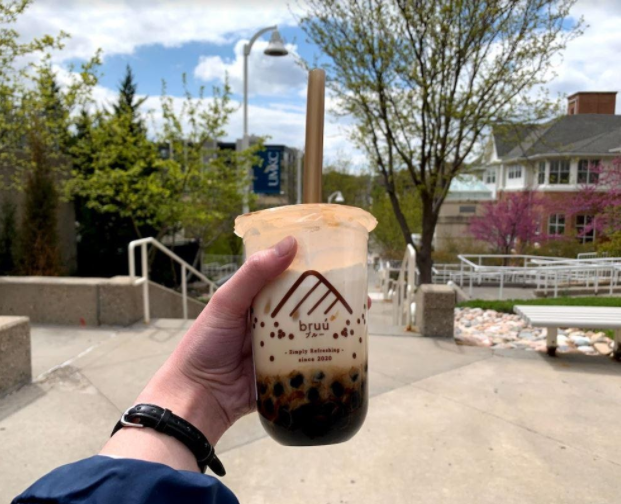The first time I tried boba tea was roughly four years ago, and I vividly recall choking on the slimy, dark tapioca pearls before trying to discreetly spew them back through the straw into the cup. I remember feeling disgusted (had I just narrowly avoided swallowing some kind of caterpillar eggs?) and frustrated (why did I just spend $5 on this gloppy beverage?). Though the drink was nauseating to me back then, with time and practice, I’ve developed a great fondness for bubble tea.
Boba tea, also known as bubble tea, is a Taiwanese beverage that traditionally consists of milk, ice, black tea and tapioca pearls. The word “boba” can refer specifically to the chewy, black tapioca pearls and also to the drink as a whole. Since its creation in the 1980s, boba has rapidly spread to nearly all parts of the globe.
Unfortunately, so has COVID-19.
Just as the pandemic affected other resources, such as toilet paper and masks, the boba industry is now suffering due to delays in shipping and receiving. The United States’ processing capacity is devastatingly insufficient to receive, unload and distribute incoming shipments of boba. As a result, numerous shops across the country are beginning to experience shortages.
“When I saw the news three days ago, I called my distributor to see if I could have another pallet of bubble tea sent,” Bay Vanithbuncha said, owner of Bruú Café on the Country Club Plaza. “They said ‘no,’ and that I’d have to call back next month.”
Vanithbuncha opened Bruú in December 2020 following an eight-month delay due to the pandemic. Because she had originally planned to open in April 2020, she had plenty of extra stock for when they were finally able to open later in the year.
“[The shortage] does not affect us right now because we overstocked,” Vanithbuncha smiled. “And some bubble tea we make from scratch!”
While most bubble tea shops have traditional tapioca pearls, Bruú also makes their own rainbow pearls to add a touch of whimsy to their beverages.
Bruú is one of the favorite bubble tea shops of Ali Stallbaumer, a sophomore studying early childhood education at UMKC. As an avid bubble tea consumer and member of Friends of Internationals (FOI), Stallbaumer is pretty familiar with the boba scene in Kansas City. Stallbaumer first tried bubble tea in 2018 at Kung Fu Tea in Overland Park, Kansas.
“My friend Gillian and I went together, and now it’s like a little tradition of ours!” Stallbaumer reflected. “We both love learning about different cultures, and we are part of a club on campus called Friends of Internationals where we made several friends from South Korea who also loved bubble tea. So naturally, we became regulars.”
Initial news of the boba shortage completely shocked Stallbaumer.
“I didn’t know this was happening!” she expressed. “Getting bubble tea has always been fun and a great way to spend time with friends. Overall, it’s a huge bummer this is happening and I think most, if not all, boba lovers would quickly agree with me.”
Right now the shortage has primarily impacted cities with a greater population density, such as New York City and Los Angeles. Barring a milk tea miracle, however, the shipping delays will undoubtedly reach the Kansas City area with time.
Most boba tea shops also sell other products such as coffee, non-boba milk teas, crepes and macaroons, so when the shortage hits, take it as an opportunity to try some different delicacies. Here’s a list of all the boba tea shops within 10 minutes of campus:
- Bruú Café (4709 Central St, Kansas City, MO 64112)
- Dragonfly Tea Zone (1809 W 39th St, Kansas City, MO 64111)
- GoCha 2 (4111 Pennsylvania Ave, Kansas City, MO 64111)
- Bambu (3920 Rainbow Blvd, Kansas City, KS 66103)
- Kung Fu Tea Westport (827 Westport Rd, Kansas City, MO 64111)
And if you’re like I was four years ago—disgusted by or hesitant about the slimy tapioca pearls—here’s your opportunity to give the drink one last shot before it’s gone for a while!
ary7n@mail.umkc.edu








